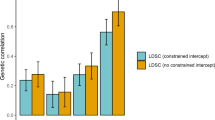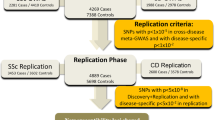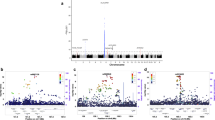Abstract
STAT3 (signal transducer and activator of transcription 3) signaling is a critical component of Th17-dependent autoimmune processes. Genome-wide association studies (GWAS) have revealed the role of the STAT3 gene in inflammatory bowel disease (IBD) susceptibility, although confirmation in clinical subphenotypes is warranted. Mice with targeted deletion of Stat3 in T cells are resistant to experimental autoimmune encephalomyelitis, which is a multiple sclerosis (MS) model. Moreover, increased phosphorylated STAT3 was reported in T cells of patients evolving from clinically isolated syndrome to defined MS and in relapsing patients. These evidences led us to analyze the role of STAT3 in Crohn's disease (CD), ulcerative colitis (UC) and MS risk. Polymorphisms in the STAT3 region (rs3809758/rs744166/rs1026916/rs12948909) were genotyped and the inferred haplotypes were subsequently analyzed in 860 IBD and 1540 MS Spanish patients and 1720 ethnically matched controls. The haplotype conformed by the risk alleles of each polymorphism was significantly associated with both clinical phenotypes of IBD (CD: P=0.005, odds ratio 1.25, 95% confidence interval 1.06–1.46; and UC: P=0.002, odds ratio 1.19, 95% confidence interval 1.02–1.38). No evidence of association was detected for MS. The originally described association of IBD with STAT3 polymorphisms is corroborated for the two clinical phenotypes, CD and UC, in an independent population. A major role of this gene in MS seems unlikely.
This is a preview of subscription content, access via your institution
Access options
Subscribe to this journal
Receive 6 digital issues and online access to articles
$119.00 per year
only $19.83 per issue
Buy this article
- Purchase on Springer Link
- Instant access to full article PDF
Prices may be subject to local taxes which are calculated during checkout

Similar content being viewed by others
References
Hampe J, Franke A, Rosenstiel P, Till A, Teuber M, Huse K et al. A genome-wide association scan of nonsynonymous SNPs identifies a susceptibility variant for Crohn disease in ATG16L1. Nat Genet 2007; 39: 207–211.
Parkes M, Barrett JC, Prescott NJ, Tremelling M, Anderson CA, Fisher SA et al. Sequence variants in the autophagy gene IRGM and multiple other replicating loci contribute to Crohn's disease susceptibility. Nat Genet 2007; 39: 830–832.
Vang T, Miletic AV, Bottini N, Mustelin T . Protein tyrosine phosphatase PTPN22 in human autoimmunity. Autoimmunity 2007; 40: 453–461.
Zhernakova A, Alizadeh BZ, Bevova M, van Leeuwen MA, Coenen MJ, Franke B et al. Novel association in chromosome 4q27 region with rheumatoid arthritis and confirmation of type 1 diabetes point to a general risk locus for autoimmune diseases. Am J Hum Genet 2007; 81: 1284–1288.
Fung EY, Smyth DJ, Howson JM, Cooper JD, Walker NM, Stevens H et al. Analysis of 17 autoimmune disease-associated variants in type 1 diabetes identifies 6q23/TNFAIP3 as a susceptibility locus. Genes Immun 2009; 10: 188–191.
Barrett JC, Hansoul S, Nicolae DL, Cho JH, Duerr RH, Rioux JD et al. Genome-wide association defines more than 30 distinct susceptibility loci for Crohn's disease. Nat Genet 2008; 40: 955–962.
Silverberg MS, Cho JH, Rioux JD, McGovern DP, Wu J, Annese V et al. Ulcerative colitis-risk loci on chromosomes 1p36 and 12q15 found by genome-wide association study. Nat Genet 2009; 41: 216–220.
Fisher SA, Tremelling M, Anderson CA, Gwilliam R, Bumpstead S, Prescott NJ et al. Genetic determinants of ulcerative colitis include the ECM1 locus and five loci implicated in Crohn's disease. Nat Genet 2008; 40: 710–712.
Anderson CA, Massey DC, Barrett JC, Prescott NJ, Tremelling M, Fisher SA et al. Investigation of Crohn's disease risk loci in ulcerative colitis further defines their molecular relationship. Gastroenterology 2009; 136: 523–529 e523.
Wellcome Trust Case Control Consortium. Genome-wide association study of 14 000 cases of seven common diseases and 3000 shared controls. Nature 2007; 447: 661–678.
Adamson AS, Collins K, Laurence A, O’Shea JJ . The current STATus of lymphocyte signaling: new roles for old players. Curr Opin Immunol 2009; 21: 161–166.
Chen Z, Laurence A, O’Shea JJ . Signal transduction pathways and transcriptional regulation in the control of Th17 differentiation. Semin Immunol 2007; 19: 400–408.
Harris TJ, Grosso JF, Yen HR, Xin H, Kortylewski M, Albesiano E et al. Cutting edge: an in vivo requirement for STAT3 signaling in TH17 development and TH17-dependent autoimmunity. J Immunol 2007; 179: 4313–4317.
Liu X, Lee YS, Yu CR, Egwuagu CE . Loss of STAT3 in CD4+ T cells prevents development of experimental autoimmune diseases. J Immunol 2008; 180: 6070–6076.
Frisullo G, Nociti V, Iorio R, Patanella AK, Marti A, Mirabella M et al. The persistency of high levels of pSTAT3 expression in circulating CD4+ T cells from CIS patients favors the early conversion to clinically defined multiple sclerosis. J Neuroimmunol 2008; 205: 126–134.
Frisullo G, Mirabella M, Angelucci F, Caggiula M, Morosetti R, Sancricca C et al. The effect of disease activity on leptin, leptin receptor and suppressor of cytokine signalling-3 expression in relapsing-remitting multiple sclerosis. J Neuroimmunol 2007; 192: 174–183.
Duerr RH, Taylor KD, Brant SR, Rioux JD, Silverberg MS, Daly MJ et al. A genome-wide association study identifies IL23R as an inflammatory bowel disease gene. Science 2006; 314: 1461–1463.
Welte T, Zhang SS, Wang T, Zhang Z, Hesslein DG, Yin Z et al. STAT3 deletion during hematopoiesis causes Crohn's disease-like pathogenesis and lethality: a critical role of STAT3 in innate immunity. Proc Natl Acad Sci USA 2003; 100: 1879–1884.
Takeda K, Kaisho T, Yoshida N, Takeda J, Kishimoto T, Akira S . Stat3 activation is responsible for IL-6-dependent T cell proliferation through preventing apoptosis: generation and characterization of T cell-specific Stat3-deficient mice. J Immunol 1998; 161: 4652–4660.
Mudter J, Weigmann B, Bartsch B, Kiesslich R, Strand D, Galle PR et al. Activation pattern of signal transducers and activators of transcription (STAT) factors in inflammatory bowel diseases. Am J Gastroenterol 2005; 100: 64–72.
Franke A, Balschun T, Karlsen TH, Hedderich J, May S, Lu T et al. Replication of signals from recent studies of Crohn's disease identifies previously unknown disease loci for ulcerative colitis. Nat Genet 2008; 40: 713–715.
Baranzini SE, Galwey NW, Wang J, Khankhanian P, Lindberg R, Pelletier D et al. Pathway and network-based analysis of genome-wide association studies in multiple sclerosis. Hum Mol Genet 2009; 18: 2078–2090.
Hafler DA, Compston A, Sawcer S, Lander ES, Daly MJ, De Jager PL et al. Risk alleles for multiple sclerosis identified by a genomewide study. N Engl J Med 2007; 357: 851–862.
De Jager PL, Jia X, Wang J, de Bakker PI, Ottoboni L, Aggarwal NT et al. Meta-analysis of genome scans and replication identify CD6, IRF8 and TNFRSF1A as new multiple sclerosis susceptibility loci. Nat Genet 2009; 41: 776–782.
Ma Y, Ohmen JD, Li Z, Bentley LG, McElree C, Pressman S et al. A genome-wide search identifies potential new susceptibility loci for Crohn's disease. Inflamm Bowel Dis 1999; 5: 271–278.
Setakis E . Statistical analysis of the GAMES studies. J Neuroimmunol 2003; 143: 47–52.
Chabas D, Baranzini SE, Mitchell D, Bernard CC, Rittling SR, Denhardt DT et al. The influence of the proinflammatory cytokine, osteopontin, on autoimmune demyelinating disease. Science 2001; 294: 1731–1735.
Vogt MH, Lopatinskaya L, Smits M, Polman CH, Nagelkerken L . Elevated osteopontin levels in active relapsing-remitting multiple sclerosis. Ann Neurol 2003; 53: 819–822.
Comabella M, Pericot I, Goertsches R, Nos C, Castillo M, Blas Navarro J et al. Plasma osteopontin levels in multiple sclerosis. J Neuroimmunol 2005; 158: 231–239.
Hensiek AE, Roxburgh R, Meranian M, Seaman S, Yeo T, Compston DA et al. Osteopontin gene and clinical severity of multiple sclerosis. J Neurol 2003; 250: 943–947.
Caillier S, Barcellos LF, Baranzini SE, Swerdlin A, Lincoln RR, Steinman L et al. Osteopontin polymorphisms and disease course in multiple sclerosis. Genes Immun 2003; 4: 312–315.
Mas A, Martinez A, de las Heras V, Bartolome M, de la Concha EG, Arroyo R et al. The 795CT polymorphism in osteopontin gene is not associated with multiple sclerosis in a Spanish population. Mult Scler 2007; 13: 250–252.
Steinman L . A molecular trio in relapse and remission in multiple sclerosis. Nat Rev Immunol 2009; 9: 440–447.
Lincoln MR, Ramagopalan SV, Chao MJ, Herrera BM, Deluca GC, Orton SM et al. Epistasis among HLA-DRB1, HLA-DQA1, and HLA-DQB1 loci determines multiple sclerosis susceptibility. Proc Natl Acad Sci USA 2009; 106: 7542–7547.
Perdigones N, Vigo AG, Lamas J, Martinez A, Balsa A, Pascual-Salcedo D et al. Evidence of epistasis between TNFRSF14 and TNFRSF6B polymorphisms in rheumatoid arthritis patients. Arthritis Rheum (in press).
Lennard-Jones JE . Classification of inflammatory bowel disease. Scand J Gastroenterol Suppl 1989; 170: 2–6; discussion 16–19.
Poser CM, Paty DW, Scheinberg L, McDonald WI, Davis FA, Ebers GC et al. New diagnostic criteria for multiple sclerosis: guidelines for research protocols. Ann Neurol 1983; 13: 227–231.
Acknowledgements
We thank Carmen Martínez and Angel García for their skillful technical assistance. Elena Urcelay works for the Fundación para la Investigación Biomédica-Hospital Clínico San Carlos. This work was supported by grants from Fundación Alfonso Martín Escudero, Fundación Ramón Areces, Fondo de Investigaciones Sanitarias PI07/0353, PI08/1676, PI08/1636 and RETICS 2007 (REEM), PN-SAF2006-02023, Junta de Andalucía Tin2007-67418-C3-03, SAS PI0168/2007.
Author information
Authors and Affiliations
Corresponding author
Ethics declarations
Competing interests
The authors declare no conflict of interest.
Rights and permissions
About this article
Cite this article
Cénit, M., Alcina, A., Márquez, A. et al. STAT3 locus in inflammatory bowel disease and multiple sclerosis susceptibility. Genes Immun 11, 264–268 (2010). https://doi.org/10.1038/gene.2010.10
Received:
Accepted:
Published:
Issue Date:
DOI: https://doi.org/10.1038/gene.2010.10
Keywords
This article is cited by
-
Advances in nanotechnology versus stem cell therapy for the theranostics of multiple sclerosis disease
Applied Nanoscience (2023)
-
Mesenchymal stem cells and acellular products attenuate murine induced colitis
Stem Cell Research & Therapy (2020)
-
Absence of specific alternatively spliced exon of CD44 in macrophages prevents colitis
Mucosal Immunology (2018)
-
Molecular pathways driving disease-specific alterations of intestinal epithelial cells
Cellular and Molecular Life Sciences (2017)
-
Meta-analysis of associations between DLG5 R30Q and P1371Q polymorphisms and susceptibility to inflammatory bowel disease
Scientific Reports (2016)



